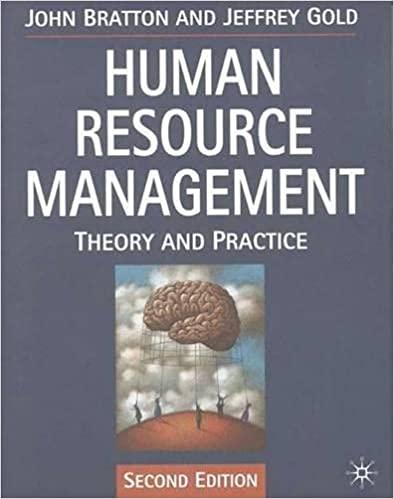Meister Software UK is the British subsidiary of a German-owned world-wide network of software companies. Meister Software
Question:
Meister Software UK is the British subsidiary of a German-owned world-wide network of software companies. Meister Software is the generic name for a range of software modules that provide a total information solution for manufacturing companies with turnovers of at least £50m. The British branch is growing rapidly and during the past year the number of employees has increased from 78 to 108. Most of the employees are graduates with either sales, computer or finance backgrounds. The work is highly pressured and results-focused, in return for which large reward packages are available.
Salesmen and women in particular need strong presentation and negotiation skills since the market is very competitive and contracts can be worth in excess of £0.5m. Recently, however, the company has had enormous difficulty in selecting the right calibre of staff for the sales role even though they are able to attract candidates in sufficient numbers.
They recently commissioned an analysis of the role to help provide a more successful model for the selection of salesmen and women at Meister. The model should allow the selection process to:
1. identify differences between recruits that are important to the role 2. carry out the identification of differences in a reliable and consistent manner 3. make valid predictions about the future performance of recruits with confidence.
The findings revealed some interesting features relating to the basic skills and attitudes needed for such a role but they also indicated how the role was expected to be performed at Meister. The first of these Meister factors concerned what was seen as 'professionalism', suggested as 'an ability to deal sensitively with prospective customers, being "human"'
rather than clinical. References were made to a style of behaviour which was 'nonthreatening'
and 'non-arrogant' but also 'challenging' when required.
Complementing 'professionalism' was the need to 'make decisions in a complex manner'.
This meant that salesmen and women were expected to be able to use large and differing amounts of information, often simultaneously, to identify patterns and develop several possible alternative actions. Such skills were accompanied by a 'tolerance for ambiguity and a capacity to empathise' with prospective customers. In particular, reference was made to the need to be able 'to understand people and political issues as well as "facts"'.
It was expected that salesmen and women would 'show pride' in working for Meister and in the Meister product. However, it was not expected that a salesman or woman would sell at all costs. Prospective customers had to be 'right' for Meister. In part this depended on how far sales staff could 'present information in a confident manner' but also how far they could 'adapt their behaviour as they formed relationships with prospective customers'. The establishment of mutual expectations were seen as a core value at Meister and a salesman or woman would need to be able quickly to identify if these could not be formed with a prospective customer. The salesman's or woman's understanding of this would partly be formed by his or her interactions with others at Meister and this highlighted the need for 'peer respect and being a team player' rather than an individualist. However, it would still be expected that sales staff would be 'self-motivating and be able to work alone'.
Step by Step Answer:

Human Resource Management Theory And Practice
ISBN: 9780333732083
2nd Edition
Authors: John Bratton, Jeffrey Gold





